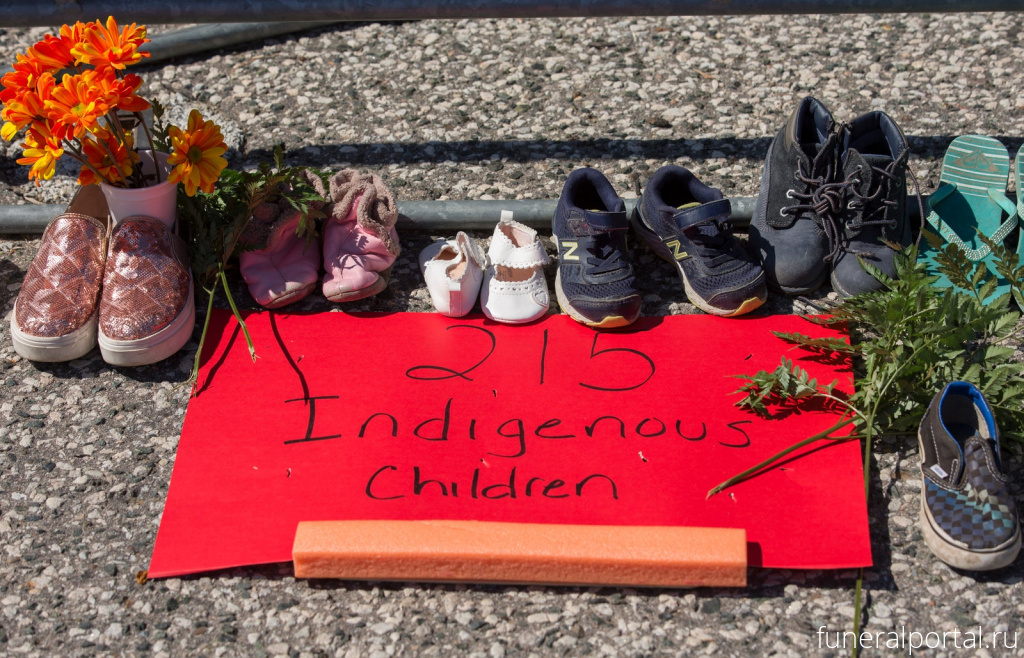The shoes and teddy bears will be in the Moose Jaw Museum and Art Gallery
Heidi Atter ·
The display shows the hundreds of shoes that were placed at the church in Moose Jaw in two areas. One area is on tiers with photographs of the shoes at the church above it. (Submitted by Cassidy Olson)
WARNING: This story contains details some readers may find distressing.
A memorial created on the steps of a Moose Jaw church in tribute to children who died at residential schools is now going to become an exhibit at a local art gallery.
Shoes and other items were placed on the steps of churches or government buildings all over Canada last month after the Tk'emlúps te Secwépemc First Nation announced the preliminary finding of unmarked graves containing 215 children at the site of the former Kamloops Indian Residential School.
Cassidy and Kayleigh Olson organized the memorial on the steps of St. Andrew's United Church in Moose Jaw. It will now be featured at the Moose Jaw Museum and Art Gallery.
"When the bodies were found, my sister and I knew that we had to do something and we just didn't know how," Cassidy told The Morning Edition. "It didn't sit well, just knowing that there were children that weren't rested."
- 'It has never been a secret that children went missing': Will the loss of 215 be a watershed moment?
The two Indigenous sisters asked the reverend at the church for permission and he said yes, as the discovery was a time to come together, Cassidy said.
"We had expected maybe a row of shoes. And by the end, we had all of the [steps] just filled with shoes and bears and candles. It was amazing. I can't even describe how I felt," Cassidy said. "We had over 500 … I was breathless."
The two Indigenous sisters' home reserve is Whitecap Dakota First Nation and the impact of residential schools is in their family.
"My grandma had actually attended residential school and so she had placed a pair of moccasins that she made when she first left residential school and she placed those on the stairs," Cassidy said. "It was big. There was a lot more emotion than I had expected."

Cassidy Olson's grandmother attended residential school. When she was finally out of school she made her first pair of moccasins. Last month she laid that pair with hundreds of others in honour of those children that didn't make it home. (Submitted by Cassidy Olson)
Each shoe had its own story behind it and it was beautiful to see it all come together, she said. After the display was up for some time, the sisters were asked what they were going to do with the shoes.
"With the amount of shoes we had, we just didn't really want to just leave them or donate them," she said. "So then I had reached out to the Moose Jaw Museum and Art Gallery."

Cassidy Olson said she hopes people use the display as an opportunity to educate themselves about the continuing effects of residential schools and intergenerational trauma. (Submitted by Cassidy Olson)
The curator was supportive in acknowledging the display, and making sure people know it wasn't just history and still affects people today. Cassidy said the curator did an amazing job.
A local photographer's shots of the shoes on the steps, and an orange t-shirt Cassidy and her sister created, are displayed above the shoes.

The display at the Moose Jaw Museum and Art Gallery features a display of the hundreds of shoes and teddy bears. (Submitted by Cassidy Olson)
Cassidy hopes people realize the effects of these schools are still ongoing today.
"It has created intergenerational trauma," she said.
"It's not just in the museum because it was history, it's in the museum because I want people to understand and be a learning tool and to educate each other."
Support is available for anyone affected by their experience at residential schools, and for those triggered by the latest reports.
A national Indian Residential School Crisis Line has been set up to provide support for residential school survivors and those affected. People can access emotional and crisis referral services by calling the 24-hour national crisis line: 1-866-925-4419.

The National Student Memorial Register was created to forever remember and honour the children who never returned home from residential schools.
https://nctr.ca/memorial/

Residential school students at a cemetery in Northern Quebec in November 3, 1946. PHOTO BY ARCHIVES DESCHÂTELETS.
Why so many children died at Indian Residential Schools
https://nationalpost.com/news/canada/newly-discovered-b-c-graves-a-grim-reminder-of-the-heartbreakin...








